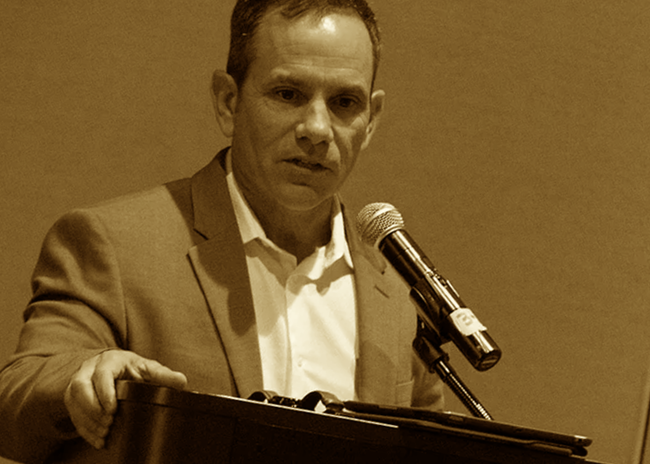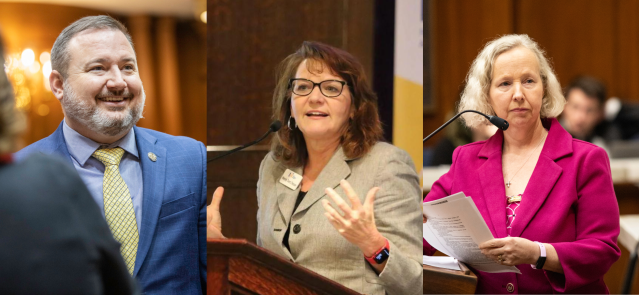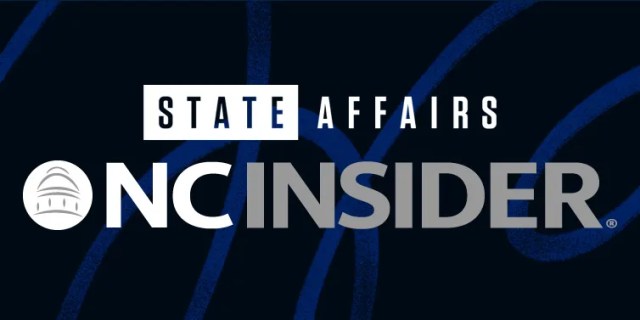YOU DON’T SAY
“Now is not the time to see if your car floats, because it doesn’t.”
Gov. Roy Cooper, on the dangers of driving through flooded areas. (The News & Observer, 8/07/24)
Olympic Spending
Dan Kane and David Raynor, The News & Observer, 8/07/24
Three years ago, state House Republicans put $25 million in the state budget for a Charlotte company aiming to become a national hub for producing Olympians.
The budget document listed one requirement — that the U.S. Performance Center use the money for “capital needs.” But a News & Observer review of those expenses shows $67,000 spent on hotels, including $1,300 to a Ritz Carlton, $55,000 to pay vehicle loans and another $34,000 for meals and entertainment. Also reported to the state is more than $13,000 used to pay late taxes and penalties to the Internal Revenue Service.
Two big recipients of the company’s grant spending are businesses led by people who are active in Republican politics.
One, along with his company, is named in a federal grand jury subpoena seeking information on a nonprofit that state lawmakers also earmarked money to. The sheer volume of U.S. Performance Center’s expenses and a lack of detail submitted about them has led the Office of State Budget and Management to have its internal auditors review the company’s grant spending, said Michael Arnold, the budget office’s deputy director.
The N.C. Sports Legacy Foundation, a nonprofit affiliated with the U.S. Performance Center, will undergo a similar review, Arnold said. It received $30 million in earmarked funding in last year’s budget to help the center’s mission.
Federal tax returns for the nonprofit reported no more than $167,500 in revenue for any single year before it received the state grant, according to ProPublica’s federal tax return database.
U.S. Performance Center’s principals — Ike Belk and David Koerner — could not be reached for comment. Company spokesman Jonathan Felts noted that state officials have not cited any problems with the center’s spending.
“We’ve met every reporting obligation that we have,” said Felts, who has worked for prominent North Carolina Republicans such as U.S. Sen. Ted Budd and former Gov. Pat McCrory. “We’ve passed everything and there have been no issues.”
The grant does not require the performance center to put contracts out to bid to get products or services for the best price, said Marcia Evans, the state budget office’s spokeswoman. The performance center needs to provide more information about how some expenditures qualify as capital needs, Evans said. Internal auditors are making sure the center knows what are acceptable purchases with state money, she said.
State lawmakers’ limited description for how the money should be spent makes it difficult for the budget office’s staff to identify what’s proper and what isn’t, Evans said. “If the grant description is written in a very vague way, you do have to ask additional questions to make sure it’s all connected,” she said of the expenditures.
State incorporation records show two members of the family that founded the Charlotte-based Belk department store chain — Belk and Suzanne Belk — started the U.S. Performance Center in 2012 with Koerner, who listed a background in exercise science.
Ike Belk’s grandfather, Irwin, who died in 2018, was a member of the U.S. Olympic Committee for decades, and a former state lawmaker.
The center describes itself as an elite training and fitness center that also conducts research focused on “advances in precision medicine, genomics, nutrition, and psychology to groundbreaking treatments for stroke and spinal cord injuries.”
Belk and Koerner in news reports and in records provided to the state budget office have described the center’s potential to build the Charlotte-area economy through increased tourism as athletes visit for training and events.
Felts said the center is a factor in Charlotte possibly winning the World Military Games in 2027.
They also say the center’s high-tech facilities foster research that could lead to breakthroughs in health care and nutrition.
In recent years it has attracted commitments from 16 US Olympic national governing bodies, half of whom now have their athletes and much of their operations staff at the center, Felts said. For the most part, these are governing bodies over sports that raise limited revenue from event tickets, corporate sponsorships and the rest. Among them are field hockey, taekwondo, archery, rugby and skateboarding.
A local Colorado Springs TV station, KRDO, did a series of reports earlier this year about the Olympic and Paralympic Training Center there losing athletes in those sports to the North Carolina business. Colorado Springs is also home to the U.S. Olympic and Paralympic Committee, and calls itself the “Olympic City.”
Expense reports filed with the N.C. budget office show the center and the legacy foundation have been using the state grant money to pay several of these governing bodies more than $100,000 in grants. USA Taekwondo has received $810,000, for instance; USA Judo received $539,000; USA Field Hockey $522,000; and USA Football $500,000.
Among the facilities in development is a bobsled training center on UNC Charlotte’s campus, state records say. It will cost $6 million, the Niner Times student newspaper reported. The performance center and the foundation have also paid USA Bobsled $525,000 in grants, the expense records show.
The $25 million for the performance center first appeared in the state House’s 2021 budget proposal, while the state Senate included no funding. The $30 million for the legacy foundation was in the state House’s budget proposal in 2023, while the state Senate offered $10 million, budget records show.
The News & Observer inquired about it for its Power & Secrecy investigative series, which is examining state budget earmarks of taxpayer money that benefit people and organizations with political connections, including for-profit businesses. The Assembly was first to publish a story on the performance center and legacy foundation spending this week.
Both legislative grants are among hundreds totaling nearly $8 billion that state lawmakers have handed out through state budgets to local governments, nonprofits and some for-profit companies since 2021, state records show.
The N&O asked state lawmakers who are chief budget writers and the staff of House Speaker Tim Moore and Senate leader Phil Berger to identify the lawmaker or lawmakers who sought the spending for the performance center and the legacy foundation. But none did.
Republicans hold a super majority in both chambers in the legislature, and two contractors who have received hundreds of thousands of dollars in consulting fees from the U.S. Performance Center’s grants have strong ties to the state GOP.
Marion Warren is a former district court judge and director of the state Administrative Office of the Courts under then Chief Supreme Court Justice Mark Martin, a Republican. Last year, UNC-Wilmington hired Warren as its legislative liaison. The center made payments to Warren’s consulting firm Juristrat totaling $390,000 in 2022 and 2023, records show.
Federal authorities are seeking information about Warren and Juristrat as part of a grand jury investigation into Caitlyn’s Courage, a newly formed nonprofit that received $3.5 million from state lawmakers to launch an electronic monitoring program in domestic violence cases.
The center made payments to Seneca Jacobs, an attorney and engineer originally from Robeson County, and his law firm totaling $373,000 for consulting services in 2022 and 2023. Most of the roughly $300,000 in campaign contributions Jacobs has made since 2012 have gone to Republicans, state election board records show. Neither Warren nor Jacobs returned The N&O’s phone calls or texts.
Both “initially provided legal services and strategic counsel on how to best partner with colleges and universities,” Felts, the U.S. Performance Center spokesman, said in a written statement. The center has since shifted that work to another law firm, he said.
The $13,000 in back taxes the center paid out of the state grant were the result of “a few employees that had been inadvertently misclassified,” Felts said. “Our accountants reviewed the previous submissions, determined additional taxes were owed, and USPC paid the additional taxes in a timely fashion,” he said.
Felts’ business, The Indie Group NC, also received $60,000 in grant money from the center last year for marketing, records show. Arnold, the state budget office’s deputy director, said his internal auditors’ review of center expenses should be completed by the end of September. [Source]
Debby Warning
Adam Wagner, The News & Observer, 8/07/24
Gov. Roy Cooper warned Wednesday that people across North Carolina need to prepare for “a deluge” from Tropical Storm Debby as it approaches the state.
“A slow-moving tropical storm can sometimes be even more deadly than a quick-moving hurricane. That means even without the constant high winds, we must be on high alert,” Cooper said during a briefing Wednesday.
North Carolina has activated 350 members of the National Guard and deployed 17 swift-water rescue teams, Cooper and N.C. Emergency Management Director Will Ray said.
President Joe Biden on Tuesday approved a request from Cooper for a disaster declaration ahead of the storm, White House officials announced. Forecasters expect the storm to drop as much as 15 inches of rain in parts of Southeastern North Carolina, causing the National Hurricane Center to warn of the potential for “considerable flooding” in the Piedmont region.
The storm was south of Charleston early Wednesday morning and is expected to drift to sea before turning inland late Wednesday or early Thursday, according to the National Weather Service.
“We expect this storm to continue its slow, gradual approach, bringing multiple days of heavy rainfall and the potential for widespread and even severe flash flooding,” Cooper said Wednesday. Cooper reminded people that 6 inches of fast-moving flood water is enough to knock over an adult, while a foot is enough to carry a car away.
“Now is not the time to see if your car floats, because it doesn’t,” Cooper said.
The emergency declaration will provide federal funds including reimbursement for evacuation and shelter support for about half of the state’s counties along Debby’s projected track. Those range from Brunswick County in the southeastern corner to Moore County, then as far to the northwest as Guilford County. Another 15 counties in the state’s northeastern and northwestern corners will be eligible to receive federal assistance for emergency protective measures they take against Debby under the disaster declaration. That includes Dare and Washington counties in the northeast, as well as Surry and Stokes in the northwest.
Federal Aid
Sarah Gleason, Wilmington StarNews, 8/07/24
President Joe Biden authorized emergency funds be used in North Carolina as Tropical Storm Debby makes its way up the coast. The announcement allows for federal aid to the state in numerous counties, according to a White House press release.
The storm has already brought rain and flooding to the coastline of North Carolina, and it’s expected to bring possible high winds as well. Much of Central and Eastern North Carolina are under a flood watch.
The announcement from Biden allows the Department of Homeland Security and Federal Emergency Management Agency (FEMA) to aid in disaster relief with the purpose of “alleviating the hardship and suffering caused by the emergency on the local population, and to provide appropriate assistance for required emergency measures, authorized under Title V of the Stafford Act, to save lives and to protect property and public health and safety, and to lessen or avert the threat of a catastrophe.”
More than 30 counties, including New Hanover, Brunswick, Cumberland and Pender, will be eligible for 75% federal funding assistance, according to the release. For a full list of counties, read the entire announcement on the White House website. [Source]
School Energy
Liz Schlemmer, WUNC Radio, 8/07/24
U.S. Secretary of Energy Jennifer Granholm made a trip to Reidsville Senior High School in Rockingham County this week to announce a grant awarded to two North Carolina school districts to make their buildings more energy efficient.
Hoke County Schools and Rockingham County Schools will each receive $300,000 to use toward energy audits and repairs. Rockingham County Schools will move onto a second phase of the Renew America’s Schools grant program and receive an additional $7.5 million dollars to make facility upgrades. Reidsville Senior High School is one of 12 schools in Rockingham County that will benefit.
“In the hallways where we had the actual announcement, it’s not air conditioned,” said Rockingham County Schools’ energy specialist Gene Kelley.
The school was built in 1960. About 20 of the cooling units on the school’s rooftop are nearly 30 years old and approaching expiration. Part of the school is heated by a boiler system that runs on natural gas. Some of the windows are the original single pane glass and others have thin plexiglass panes. “We could probably spend half of the money of the grant right there [on window replacements],” Kelley said.
Rockingham County Schools was selected for the Renew America’s Schools grant based primarily on need. The grant program began in 2023 with federal funding from the $1 trillion infrastructure law that Congress passed in 2021.
This program is the first time that the U.S. Department of Energy has been able to fund K-12 schools directly, said Andrea Swiatocha, who helps administer the program. “We are so thrilled that we have this funding,” Swiatocha said. “We know the need is greater than the funding we have, but we’re excited to do really great and important work with the funding that we do have.”
Many students across North Carolina attend schools that are more than 50 years old. In rural areas that have a smaller local tax base, it can be difficult to raise local funding for construction and repairs through tax bond referendums voted on in county elections. As school buildings age, so does their energy infrastructure, and that can drive up maintenance costs and utility bills.
Rockingham County Schools’ energy specialist Gene Kelley said the school system spends about $3 million on energy costs each year, even after a recent round of upgrades. He is hoping to decrease that by about 15% by making improvements at twelve schools. The district will work with one of its HVAC providers, Johnson Controls, Inc., to determine how it can make the most cost effective upgrades to save energy and lower school utility bills.
Hoke County Schools plans to use its $300,000 in funding toward planned upgrades the district has estimated could cost $5 million. About half the schools in the district were built before 1979 and are in need of boiler replacements and HVAC upgrades. [Source]
Parental Leave
Clayton Henkel, NC Newsline, 8/07/24
State education leaders on Wednesday gave final approval to a permanent rule offering paid parental leave to public school employees. Under the policy, a full-time eligible employee who is a birthing parent will be entitled to eight weeks of paid parental leave.
The policy divides that leave time into four weeks of “physical and mental recuperation” and an additional four weeks for parent-child bonding. A non-birthing parent will be entitled to four weeks for parent-child bonding.
A part-time eligible school employee who becomes a parent is entitled to a prorated share of paid parental leave, based upon the hours in that employee’s weekly schedule. If a newborn is placed up for adoption or into foster care, the parental leave is limited to four weeks.
The permanent rule also establishes guidelines for school employees who may experience a miscarriage or stillbirth, allowing the birthing parent to receive four weeks of leave after the first trimester. If a newborn dies after birth, both parents would be entitled to the full eight-week benefit.
The State Human Resources Commission adopted temporary rules back in 2023 with the State Board of Education (SBE) also passing a temporary policy in October of last year. Wednesday’s action clarifies some previous questions and makes the statutory paid parental leave rule permanent.
Although the state board previously allowed public school employees to take unpaid leave for up to one calendar year following the birth or adoption of a child, employees are now entitled to a paid parental leave benefit.
The state board estimates that the proposed rule will have an annual cost ranging between $324,000 and $436,000 statewide, though that figure could vary greatly based the rate of utilization and other factors like future pay increases.
Charter schools can choose to adopt the policy if their respective boards of directors agree.
The General Assembly appropriated $10 million in recurring funds for the 2023-2024 and 2024-2025 school year to help the public school system pay for the leave benefit and hire substitute teachers.
A fiscal analysis prepared for the State Board of Education notes that public school employees are “disproportionately young and female when compared to the State’s labor force as a whole” making the paid parental leave policy a valuable tool for recruitment and retention. [Source]
UNC Chancellor
Ray Gronberg, Business NC, 8/07/24
The UNC System’s Board of Governors will meet this Friday morning to ratify the selection of a new chancellor for the system’s flagship university in Chapel Hill. Formally, a board committee will first review the selection and advise on the terms of an employment contract. The full board will then make the final decision.
In reality, System President Peter Hans is making the selection, with the board acting as a check and balance. System policy says the BOG will vote on the president’s nominee.
The new hire will replace former Chancellor Kevin Guskiewicz, who left to become president of Michigan State University.
Former State Budget Director Lee Roberts has been serving as interim chancellor since Jan. 12. He is the odds-on favorite to receive the job on a permanent basis, given that N.C. House Speaker Tim Moore and Senate leader Phil Berger have both offered him public endorsements. [Source]
Vance Event
Sarah Gleason, Wilmington StarNews, 8/07/24
JD Vance canceled his two press events planned for Thursday in North Carolina due to weather from Tropical Storm Debby, the campaign alerted media.
Donald Trump’s running mate had a morning visit to Raleigh and another visit to Oakboro on the calendar. Kamala Harris also had an event in the works for Thursday in the Research Triangle, but her campaign also postponed the event. Neither campaign has provided a new event time.
Flooding and heavy rainfall have already affected some of North Carolina’s coastline and the storm is expected to bring more rain and wind in the coming days. [Source]
Contraception Access
Rachel Crumpler, NC Health News, 8/08/24
Several recent changes have allowed pharmacies to play a larger role in reproductive health care access. That’s important since contraception has become a key consideration amid increased restrictions on abortion, said Mollie Scott, regional associate dean at the UNC-Chapel Hill Eshelman School of Pharmacy.
Pharmacists in North Carolina were granted the ability to provide hormonal contraceptives without a medical provider’s prescription when a new law, House Bill 96, took effect on Feb. 1, 2022. Since then, more than 330 pharmacists have stepped up to provide contraception services in 92 counties.
The first over-the-counter birth control pill available in the United States — Opill — also hit store shelves earlier this year. The option marked a significant shift in how to obtain contraception by eliminating the need for a prescription.
Last week, Opill became even more accessible when NC Medicaid began covering the cost of the over-the-counter oral contraception in pharmacies across North Carolina. This means that the pill, which retails for $20 for a one-month supply, will be available at no cost to Medicaid beneficiaries.
NC Medicaid also pays for pharmacist-initiated contraceptive counseling services at pharmacies.
“By increasing access to contraception, we can improve maternal and infant health,” Betsey Tilson, state health director, said while standing with Gov. Roy Cooper in a Walgreens pharmacy in Chapel Hill on July 31. “We can also make sure people have the tools and resources they need to make the best decision for them of what’s the right time to be a parent.”
Annual surveys by the state Department of Health and Human Services show that more than four in 10 pregnancies in North Carolina are unintended. Tilson said that access to contraception is key to preventing these types of pregnancies, which can result in poorer outcomes for mothers and babies.
In North Carolina, 637,960 women with low income live in areas that can be classified as “contraceptive deserts,” according to data from the nationwide pregnancy prevention advocacy group Power to Decide. A contraceptive desert is a county or area that lacks reasonable access to a health center that offers the full range of contraceptive methods, such as a gynecologist’s office or a community health clinic.
Scott said pharmacies have the potential to fill critical gaps in contraceptive access since almost 90 percent of the U.S. population lives within five miles of a community pharmacy. [Source]
Coastal Rules
Trista Talton, Coastal Review, 8/07/24
A set of coastal development rules temporarily placed back in the state code will be up for public comment and possibly reinstated as permanent by year’s end. The Coastal Resources Commission, during a special meeting Tuesday, unanimously approved a rule that sets permit fees for minor and major development applications, approved the fiscal impact analyses on that and several other rules the commission adopted as temporary earlier this year, and re-designated Jockey’s Ridge State Park as an area of environmental concern.
The fiscal impact analysis measures how rules may affect a government’s revenue and expenditures to help prepare for or prevent budget shortfalls.
The North Carolina Department of Environmental Quality and Office of State Budget and Management have determined that reinstating the rules will not substantially impact the economy and have little to no impact on state or local governments.
Commissioners postponed a vote this week to amend a rule that would allow beach towns to use wheat straw bales as an alternative to traditional sand fencing, which is used to protect oceanfront dunes. The state Division of Coastal Management’s fiscal analysis on the amendment to that rule is currently under review by the state budget and management office.
Coastal management officials determined in their analysis that the amendment would have little to no fiscal impact.
The commission in March adopted more than a dozen rules state coastal management officials argue are crucial to day-to-day operations as temporary as a means to get them back into the state Administrative Code for one year or until they are reinstated as permanent rules.
In all, 30 of the Coastal Commission’s longstanding rules were removed from the code last October after they were objected to by the Rules Review Commission, a decision that prompted an ongoing lawsuit the Coastal Commission and DEQ filed against the Rules Review Commission and the state codifier or rules. [Source]
Price Gouging
Michael Perchick, WTVD News, 8/07/24
Monday, Gov. Roy Cooper declared a State of Emergency due to Tropical Storm Debby, with Attorney General Josh Stein announcing the state’s price gouging law is now in effect. “What we don’t want as for sellers of goods or services, to take advantage of people’s desperation, to make a quick buck,” said Stein.
The law applies to essential items and services, ranging from water and food to gas and batteries, and extends to repairs in the storm’s aftermath.
“It’s not an objective measure. There’s not a percentage increase. It’s very subjective. And the law says unreasonably excessive price increases. And so part of it is the eye of the beholder. We have a lot of experience with this. So that’s why we encourage folks to let us know so we can investigate, because you may not be sure if it’s price gouging or not, let us take a look,” said Stein.
However, not all price increases are necessarily violations of the law.
“Are there up charges coming from your suppliers or that the product is in high demand and so you’re having to pay more for it to get it on your shelf or to put it in your pump,” said Andy Ellen, President and General Counsel of the North Carolina Retail Merchants Association. The law has been in place since 2005, with Ellen explaining operators are fully aware of their responsibilities.
Stein noted his office has taken about two dozen companies to court over the past few years and won back more than $1 million stemming from violations. [Source]
ENC Infrastructure
The Warren Record, 8/07/24
Congressman Don Davis announced in a release that four applicants in North Carolina’s First Congressional District will be among the first recipients of the Southeast Crescent Regional Commission’s inaugural State Economic and Infrastructure Development grant program.
“These federal investments, made through the Southeast Crescent Regional Commission, aim to enhance infrastructure and stimulate economic growth. The NC First Congressional District’s counties are some of our state’s most economically distressed areas,” said Davis. “We can make a difference by addressing economic disparities and promoting regional development. There is a critical need to focus on investing in infrastructure and economic development initiatives across the East.”
Four North Carolina First Congressional District applicants will receive a total of $1,335,620:
- Bertie, Hertford, and Northampton Counties: Roanoke-Chowan Community College: Weld to Work Pipeline $470,140
- Greene County: Lenoir Community College: Aviation Academy $285,480
- Vance County, City of Henderson: Low-Pressure Pump Station $500,000
- Warren County, Town of Warrenton: Developing Frontier Warren’s Entrepreneurial Ecosystem $80,000 [Source]
Lejeune Water
Jay Price, WUNC Radio, 8/07/24
Facing an Aug. 10 deadline, hundreds of thousands of Marine Corps veterans, family members, and others have filed claims in one of the biggest toxic exposure cases in the nation’s history.
From 1953 to 1987, tainted water on Camp Lejeune, N.C. was laced with chemicals that have been linked to a host of illnesses, including several forms of cancer and Parkinson’s Disease. Though some of the toxins were found in the water by the early 1980s, it took years of efforts by a handful of veterans and attorneys, then finally an act of Congress in 2022 to open the two-year window for claims.
Under the law, until that Aug. 10 deadline, those whose illnesses can be linked to the water can file a claim with the Navy seeking a settlement. If they are turned down, don’t get a response within six months, or don’t agree with the government’s settlement offer, they can file suit.
Days before the deadline, more than 320,000 claims had been filed. A Navy spokesman said some are duplicates that will be weeded out. But more are coming in.
Ed Bell is among hundreds of plaintiffs attorneys in the case. He leads a small team of lawyers appointed by the court to help manage the case, and he was earlier involved in drafting the law that allowed the claims process and lawsuits. Bell said despite heavy advertising by some attorneys, which has appeared on on television, radio, and online for more than a year, his firm has continued to field queries from potential claimants in the days before the deadline.
“We’ve had a flurry of calls lately,” Bell said. “And there is a lot of unknown out there. And while some people complain about the lawyer advertising, sometimes that advertising itself is confusing. So I think there are a lot of people out there that don’t fully appreciate the impact of Aug. 10.”
Claims can be filed online, and they don’t require a lawyer. The Navy can respond to claims with a settlement offer.
While the claims deadline is a major milestone in the case, there’s also recently been another. The court has selected the first 25 plaintiffs who will get their day in court as test cases. Those so-called “bellwether trials” can be an important step toward bringing such huge legal battles to a close.
The goal is to settle the vast majority of cases out of court. Last year, one of the four federal judges handling the cases said trying them all would take hundreds of years, and given the age and health issues of many plaintiffs, the process needed to move quickly.
The government has begun settling at least some claims outside the courts. At the beginning of August, it had made offers in 109 cases, and 64 were accepted, with settlements averaging about $250,000. The size of the settlements varied, based on the illness, the amount of exposure, and whether the claim was filed on behalf of someone who had died. The highest possible was $550,000. [Source]
Canton Fire Station
Cory Vaillancourt, Smoky Mountain News, 8/01/24
The effects of deadly flooding in 2021 are still being felt in the town of Canton, but thanks to a federal funding request from U.S. Sen. Thom Tillis, the town is poised to take another huge step toward recovery. According to a document from the Transportation, Housing and Urban Development Appropriations Committee outlining congressionally directed spending, Tillis has requested just under $5.8 million to help the Town of Canton replace its fire station, which was damaged during the floods.
The appropriations bill provides funding for a slew of federal programs, mainly within the purview of the Department of Transportation and Department of Housing and Urban Development. Tillis’ request, which was approved by the appropriations committee along with more than a thousand others totaling $98.7 billion, still has to be formally approved by the full Senate before it proceeds to the House, likely by the end of the year. [Source]
Road Trash
Luke Fountain, The Charlotte Observer, 8/07/24
North Carolina’s roadways have become an impromptu dumping ground for everything from Bojangles boxes and Cheerwine bottles to building materials and bulky appliances. Unsecured truckloads also pose a danger. Beyond the obvious eyesore, this trash jeopardizes driver safety, harms the environment and depletes local resources, officials said. And the problem is growing.
Crews collected nearly 1.5 million pounds of trash from Mecklenburg County roads last year — an increase of about 50% from five years ago. Officials anticipate little improvement due to a growing population, rising costs and lingering pandemic effects.
“We’re picking up more than we ever have,” North Carolina Department of Transportation engineer Felix Obregon said. “There are more folks coming into Charlotte and more traffic on the roads. This is a constant issue.”
The NCDOT manages more than 3,000 miles of roads in Mecklenburg. It usually cleans interstates every other month and secondary roads less frequently, but budget cuts reduced the frequency of scheduled cleanings, Obregon said.
“As soon as we clean the roads, folks keep on throwing trash on them,” he said.
In fiscal year 2024, which ended in June, the department spent over $800,000 to collect more than 1.2 million pounds of litter in Mecklenburg. That’s up from about $770,000 spent in 2023 for around one million pounds collected.
The city of Charlotte also has a dedicated unit for cleaning uptown, North Tryon and South End. The city, along with volunteer groups led by Keep Charlotte Beautiful, collected upwards of 300,000 pounds of trash last year. “There are areas in the city that need to be cleaned multiple times a day due to the volume of trash,” said Eric DeLaPena, deputy director of operations for Charlotte’s Solid Waste Services. “Sometimes we need to slow traffic to manage it.”
Public outcry over litter-strewn roads, and efforts to address it, date back at least to the 1980s in North Carolina. NCDOT initiated the Adopt-A-Highway program in 1988, expanded with the Sponsor-A-Highway program in 2011 and introduced the “Swat-A-Litterbug” app in 2021 to make reporting littering easier.
“Trash can fly up or stuff gets loose and flings out the back of trucks and can possibly hit another vehicle. Someone could run over trash and lose control of their car,” NCDOT spokesperson Jennifer Goodwin said. “It can be very dangerous and isn’t isolated.” [Source]
Gunshot Detection
David Ford, WFDD Radio, 8/07/24
Winston-Salem Police Department officials have decided not to renew their contract with ShotSpotter, a technology that detects gunshots and alerts law enforcement.
The program was launched in August of 2021, partially in response to a 50% rise in homicides that year. Within its first month of full operation, according to the agency, ShotSpotter detected more than 200 rounds of gunfire. But the technology covered a relatively small portion of the city — some 3 square miles — and at a cost of nearly a quarter million dollars. According to its press release, the police department never budgeted for the service. Now that the Crime Gun Intelligence Center grant period has concluded, the decision was made not to renew the contract.
Moving forward, the Winston-Salem Police Department plans to shift focus to other technologies in an effort to provide enhanced security for the entire community. The ShotSpotter contract will end in September. [Source]
Airbnb Regulations
Sarah Honosky, Asheville Citizen Times, 8/07/24
Buncombe County Commissioners established an ad hoc committee on Aug. 6 to consider future regulation of short-term rentals, a touchy topic following a series of heated public hearings, with the Planning Board ultimately tabling proposed amendments in April.
Since the vote was tabled, no further progress has been made, said Nathan Pennington, the county’s planning director. After informal discussion at its July 16 meeting, county commissioners requested a committee be established to review the previous work of the Planning Board, evaluate short-term rental regulations, identify policy implications and provide feedback to the board.
The committee will provide recommendations to the Planning Board by November, which, in turn, will offer a formal recommendation to commissioners. The term of the ad hoc committee will expire on Nov. 30. As Chair Brownie Newman stressed, it is a “time-limited, focused working group.”
Critics of short-term rentals, commonly referred to as Airbnbs, fear they exacerbate housing costs and strain supply, while some proponents dispute the idea, with residents insisting they are reliant on STRs for needed income.
Buncombe County Planning Board members previously expressed concern over what they called “misinformation” and “propaganda” surrounding the issue, leading the board to postpone a vote.
At the center of the debate, and alleged misinformation is the Realtor-funded “No Ban For Buncombe,” a local campaign with the slogan “Don’t Kill Our Economy,” a message the group has delivered across Buncombe County via mail, online and on television screens, the Citizen Times reported in April.
Under the previously proposed regulations — the vote for which was deferred — all existing STRs would be grandfathered in, allowing them to continue renting, but limiting them to certain zones and requiring a permit to stay active. Other possible regulations included restrictions on size, waste management and types of structures that can be used as STRs. [Source]
Ferry Schedule
Port City Daily, 8/07/24
The North Carolina Utilities Commission will hold a public hearing next week to review BHI Transportation’s petition to change the schedule of the island ferry. The hearing will be held on Aug. 13 at 7 p.m. in Court Room 2 of the Brunswick County Courthouse.
Earlier this year, the ferry’s current owner BHI Transportation requested to change the hourly schedule of the passenger ferry to a 90-minute schedule in an attempt to improve on-time performance.
The Village of Bald Head Island intervened in the case along with the BHI Club, Bald Head Association, and BHI Academy, claiming a 90-minute schedule provides enough capacity to meet the island’s current and growing demand. The employee ferry would remain on the same schedule.
According to BHIT, there is not sufficient time in the current schedule to maintain its goal of punctuality 95% of the time. In 2023, it only reached 76%, and only 66% and 68% in 2021 and 2022, respectively.
The North Carolina Utilities Commission must sign off on the change; it regulates the ferry system, which includes the ferry, tram, barge and parking.
This is not the only case the village is intervening in; it is also appealing the court decision that its right-of-first refusal agreement to purchase the ferry system, which the village has been trying to do for years, is invalid. The Superior Court of Brunswick County found the agreement was void because it was never signed by the utilities commission. [Source]
Resignation
Rebecca Sitzes, The Shelby Star, 8/07/24
A long-time Kings Mountain city councilman submitted his letter of resignation last month. David Allen, who was first elected in 2017 to fill the at-large seat, resigned July 31.
According to his LinkedIn profile, he spent 28 years working for the North Carolina State Highway Patrol and currently works as a leadership instructor for Allen Solutions and as a certified speaker, trainer and coach for John Maxwell Solutions.
A letter from Allen, addressed to Mayor Rob Wagman and the council, was read by Annie Thombs at the latest meeting.
“When I originally sought office it was a single monthly meeting and I could make that without conflict. Recently with the growth occurring in Kings Mountain, the necessity to meet more often has increased to three plus meetings a month.” Allen said his business requires him to travel across the country to provide leadership services. He said business opportunities have increased and he needs to focus on his family.
Thombs said Allen would be missed. She said the council will have to call a work session with the city attorney’s guidance on how to proceed. Allen’s term would have ended Nov. 2025. [Source]
Shoplifting Charges
Kevin Griffin, Greensboro News & Record, 8/07/24
Guilford County prosecutors dropped shoplifting-related charges against the director of a major Greensboro nonprofit last month after she completed a deferral program. Assistant District Attorney Chris Parrish confirmed Tuesday that the charges against Kristina Singleton, executive director of the Interactive Resource Center, were voluntarily dismissed. The case was resolved on July 17, according to information in the eCourts system.
Singleton was charged with four counts of misdemeanor larceny in February. She was accused of stealing nearly $400 worth of clothes, phone charges, gift bags and other items from the Target locations on Lawndale Drive and Bidford Parkway in December. Parrish said Singleton took part in a first-offender program.
Though he did not know exactly what conditions Singleton needed to satisfy, he said the programs typically involve community service and classes. Singleton has also paid restitution, according to the eCourts system.
Singleton has served as the center’s director for nearly three years and spent nearly a decade working with the organization which operates a drop-in center providing services to homeless people. Singleton stepped away from the organization briefly following the charges but had resumed her role by early spring.
The center’s board issued a statement of support after Singleton was initially charged. On Tuesday, board Chairman Jim King reiterated that support. “I have total confidence in her ability to do her job as executive director of the IRC and that’s what I’m concerned about,” he said. [Source]
NC Insider Legislative Report
LB: LEGISLATIVE BUILDING. LOB: LEGISLATIVE OFFICE BUILDING
HOUSE CALENDAR
Monday, Sept. 9, 2024
House Convenes at 12 P.M.
SENATE CALENDAR
Monday, Sept. 9, 2024
Senate Convenes at 12 P.M.
HOUSE & SENATE: Reconvening allowed under provisions of SB 916, if no sine die adjournment previously adopted.
- Monday, Sept. 9 to Wednesday, Sept. 11
- Wednesday, Oct. 9
- Tuesday, Nov. 19 to Friday Nov. 22
- Wednesday, Dec. 11 to Friday Dec. 13
Legislative Studies and Meetings
LB: LEGISLATIVE BUILDING. LOB: LEGISLATIVE OFFICE BUILDING
Thursday, August 22
- 2 p.m. | America’s Semiquincentennial Committee, 1228/1327 LB
Thursday, August 29
- 1 p.m. | Agriculture and Forestry Awareness Study Commission, Ed Emory Auditorium, Kenansville.
N.C. Government Meetings and Hearings
BOLD ITEMS ARE NEW LISTINGS
Thursday, Aug. 8
- 9:30 a.m. | North Carolina Taskforce for Offshore Wind Economic Resource Strategies (NC TOWERS), ECU’s Coastal Studies Institute 850 NC 345, Wanchese.
- 10 a.m. | Quarterly Meeting of the State Ethics Commission, 424 North Blount St, Raleigh.
Tuesday, Aug. 13
- 11 a.m. | Economic Investment Committee – Regular Meeting, 301 N. Wilmington St, Raleigh.
Wednesday, Aug. 14
- 9 a.m. | North Carolina Real Estate Commission Meeting, 1313 Navaho Drive, Raleigh.
Monday, Aug. 19
- 2 p.m. | The Executive Committee of The North Carolina Partnership for Children meets, The meeting will be held via Zoom. You may contact Yvonne Huntley at 984.221.1242 or email at [email protected] for additional information.
UNC Board of Governors
23 S. WEST STREET, SUITE 1800, RALEIGH
Wednesday, Sept. 11
- Meeting of the Board of Governors, TBA.
Thursday, Sept. 12
- Meeting of the Board of Governors, TBA.
Thursday, Oct. 17
- Meeting of the Board of Governors, TBA.
Wednesday, Nov. 13
- Meeting of the Board of Governors, TBA.
Thursday, Nov. 14
- Meeting of the Board of Governors, TBA.
N.C. Utilities Commission Hearing Schedule
DOBBS BUILDING, 430 NORTH SALISBURY STREET, RALEIGH
Tuesday, Aug. 13
- 10 a.m. | Public Hearing – Annual Review of Gas Costs | G-5 Sub 675
Wednesday, Aug. 14
- 7 p.m. | Public Witness Hearing – Application for General Rate Increase for Piedmont Natural Gas Company, Inc. | G-9 Sub 837
Tuesday, Aug. 20
- 6 p.m. | Public Witness Hearing – Application for Transfer of Public Utility Franchise and Approval of Rates of HISCO East, LLC in Carteret County to HISCO I in Carteret County | W-1297 Sub 17, W-1344 Sub 0
- 6 p.m. | Public Witness Hearing – Application for Certificate of Public Convenience and Necessity and for Approval of Rates to Provide Sewer Utility Service to Currently Served Cape Ponte Village Subdivision, Additional Phases for the National Park Service, Harkers Island RV Park and a Fe | W-1344 Sub 1
Wednesday, Aug. 21
- 7 p.m. | Public Witness Hearing – Application for General Rate Increase for Piedmont Natural Gas Company, Inc. | G-9 Sub 837
Thursday, Aug. 22
- 7 p.m. | Public Witness Hearing – Application for General Rate Increase for Piedmont Natural Gas Company, Inc. | G-9 Sub 837
Other Meetings and Events of Interest
BOLD ITEMS ARE NEW LISTINGS
Thursday, Aug. 8
- 11 a.m. | Gov. Roy Cooper to visit North Carolina National Guard Armory to meet with NCNG Members and swift water rescue team members to discuss impacts of Tropical Storm Debby, NCNG Kinston Armory, 2001 Dobbs Farm Rd, Kinston.
Friday, Sept. 27
-2024 Lumbee Powwow, Lumbee Tribe Cultural Center, 638 Terry Sanford Drive, Maxton.











